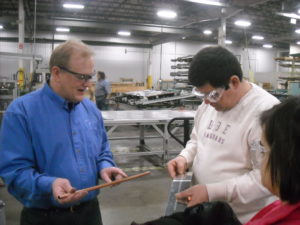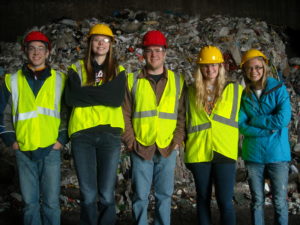
How much waste in schools can be composted? YES! students recently learned that 30 percent of waste generated in schools is compostable. Over 40 students and teachers from the YES! teams at Eden Valley-Watkins, New York Mills, Redwood Falls, ACGC and Brooten-Belgrade-Elrosa visited Alexandria on February 13th to learn new strategies for using renewable energy and going green in their schools and communities.
The day started with a tour of Solar Skies, LLC where students learned how a solar panel is made and peaked at the only laser welder for solar panels in the United States. They learned that “using passive solar energy is very important to our community and can prevent future problems.” Randy Hagen, owner of Solar Skies, surprised students by noting “Minnesota is similar to Texas in the amount of sunny days each year.”

Next stop was Pope/Douglas Solid Waste (PDSW) where the students learned about hazardous waste, recycling practices and the benefits of reducing waste. The PDSW employees encouraged students to vermicompost and invited students to visit the reuse it store where anyone can get free paints and stains. Students gasped as they saw mounds of garbage moved with a giant claw to the incinerator to be burned. The waste-to-energy facility burns garbage to produce steam energy for Douglas County Hospital, 3M and Alexandria Technical & Community College.
The students were then able to see this steam energy in action as they headed over to Alexandria Technical & Community College. Tim Tougas, Operations Manager, took teams through the school where he highlighted energy efficient areas of the school, including hydration stations. A hydration station allows students to fill up reusable water bottles, saving thousands of plastic waters bottles from the landfill or recycling containers. Many teams are looking to install hydration stations in their school and appreciated the opportunity to see a hydration station in action at ATCC. Finally, Kristin Daby, instructor at ATCC impressed upon teams the impact they can have by doing projects that reduce, reuse and recycle in their school. The day concluded with teams having time to interact and learn from each other about energy projects they are working on. Overall the students commented the day was “a very fun and educational experience.”
